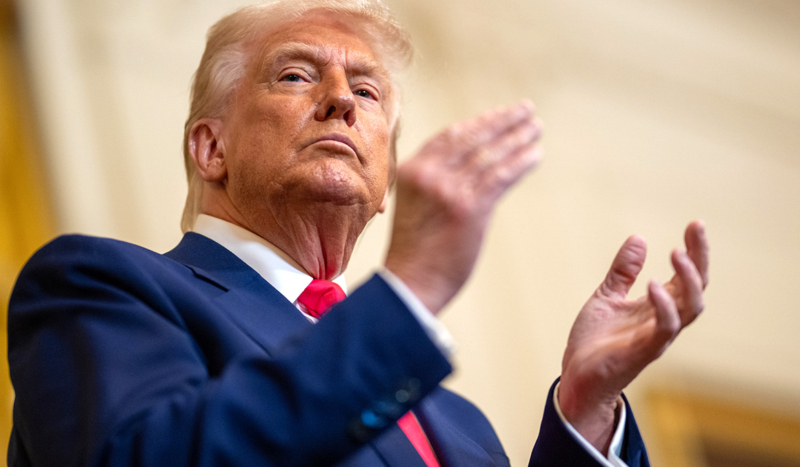
The White House / Flickr
CV NEWS FEED // In the first 100 days of President Donald Trump’s second term, the Trump administration has pursued major reforms in border security, pro-life policy, religious freedom, government operations, and economic policy—even as federal judges challenge his agenda.
Border security: Historic lows
Illegal crossings at the southern border have collapsed to record lows. In February, Customs and Border Protection reported just 8,347 illegal crossings—a 90% drop from the year prior. March numbers fell even further to 7,818.
White House Press Secretary Karoline Leavitt credited Trump’s leadership Monday.
She noted that only nine illegal immigrants were released into the US between Trump’s inauguration and April, compared to 184,000 during the same period under former President Joe Biden.
While Trump has faced opposition from Catholic bishops on some measures, some bishops have voiced their support for his efforts to improve border security.
Georgia’s bishops endorsed the deportation of criminal offenders, while emphasizing the need for humane treatment.
Kansas City Archbishop Paul Coakley similarly praised Trump’s efforts to combat human and drug trafficking, affirming the Church’s teaching that nations have a right to secure borders.
“Sadly, some of those who have entered our country, legally or illegally, have committed serious crimes,” stated Arlington Bishop Michael Burbidge in a pastoral letter. “There must be consequences for such behavior, as there is no place for violence, trafficking, or gang activity in our society.”
Pro-life victories
Upon taking office, Trump pardoned 23 pro-life activists targeted under Biden’s Department of Justice. He also reinstated the pro-life Hyde Amendment, expanded the Mexico City Policy, and withdrew US support from pro-abortion groups abroad.
The United States Conference of Catholic Bishops (USCCB) welcomed the moves, with Bishop Daniel Thomas of Toledo, Ohio, praising the decision to end taxpayer-funded abortion.
Marjorie Dannenfelser of Susan B. Anthony Pro-Life America hailed the early days of Trump’s second term as a “golden age” for the movement.
However, Catholic leaders strongly objected to Trump’s February executive order favoring in vitro fertilization (IVF). Bishops Daniel Thomas and Robert Barron called the policy “fatally flawed,” as it encourages a major violation of human dignity.
“The IVF industry treats human beings like products and freezes or kills millions of children who are not selected for transfer to a womb or do not survive,” the bishops wrote.
DOGE reports on waste, fraud, and abuse
Trump’s newly created Department of Government Efficiency (DOGE) reports nearly $160 billion in taxpayer savings, partly through eliminating controversial diversity, equity, and inclusion (DEI) programs across federal agencies.
DOGE also uncovered abuses within the US Agency for International Development (USAID), including taxpayer-funded initiatives promoting “sex changes,” “LGBT activism,” “transgender” programs, and the 3D printing of contraceptives in developing countries.
“Americans are sick of insider games and having millions wasted on ridiculous things like transgender comic books,” said CatholicVote Vice President Joshua Mercer.
“America First” tariffs
In April, Trump launched “Liberation Day” tariffs, targeting nations accused of unfair trade practices. He raised tariffs on China to 145%, while freezing them for 75 allied countries as part of his “America First” economic agenda.
Treasury Secretary Scott Bessent said the strategy marked a shift toward favoring the working class: “It’s Main Street’s turn to restore the American Dream.”
Religious freedom: Defending faith in public life
Religious freedom remained a top priority during Trump’s first 100 days. He created a task force to combat anti-Christian bias and issued executive orders shielding youth from radical gender ideology.
Vice President JD Vance also brought his Catholic faith into public life, outlining key tenets of Catholic social teaching and leading prayers for Pope Francis at the National Catholic Prayer Breakfast.
Before assuming office, Trump nominated CatholicVote President Brian Burch as US Ambassador to the Holy See. The Senate Foreign Relations Committee is scheduled to take the initial Senate vote on the nomination this week.
On Ash Wednesday, Trump and First Lady Melania joined Catholics in prayer, calling Christ “our Lord and Savior” in a White House statement. On Easter Sunday, one day before Pope Francis’ death, Vance met privately with the pope at the Vatican and accepted a rosary as a gift.
Following the pope’s passing, Trump ordered US flags to fly half-staff in the pope’s honor and attended the funeral in Rome.
Judicial battles and activist judges
Despite significant policy changes, Trump’s second-term agenda has been repeatedly challenged by the judiciary.
Federal judges blocked key immigration policies, including the deportation of Venezuelan nationals under the Alien Enemies Act and efforts to revoke protected status for certain immigrant groups.
Judges have also delayed Trump’s education reforms and key executive orders.
Three weeks into the new term, Vance warned against judicial overreach, stating that “[j]udges aren’t allowed to control the executive’s legitimate power.”
Trump echoed Vance last week, criticizing “activist judges.”
“We’re going to have a very dangerous country if we’re not allowed to do what we’re entitled to do,” he said.
CatholicVote’s Mercer said Monday that while the administration’s first 100 days have been “an impressive start,” judicial obstruction remains a serious concern.
“It’s incumbent on the Supreme Court and Congress to ensure that the President’s policies are not undone,” he said.

